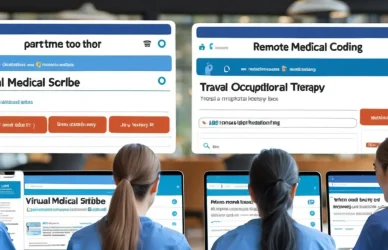In the ever-evolving world of healthcare, forging connections with leaders is paramount. Networking can unlock a treasure trove of knowledge, propel your career forward, and pave the way for collaborative ventures that can transform patient care. This comprehensive guide delves into the significance of networking within the U.S. healthcare industry and equips you with practical strategies to connect with influential figures[1].
Why Networking Matters in Healthcare
Networking offers a wealth of advantages for healthcare professionals:
- Knowledge Sharing and Continuous Learning: Networking provides access to a vast pool of knowledge and experience. By engaging with peers, you can stay abreast of the latest medical breakthroughs, innovative treatments, and best practices[1]. This exchange of information can lead to adopting new practices that enhance patient care[2].
- For example, imagine a physician attending a conference where a colleague presents a groundbreaking approach to managing a specific condition. This interaction could inspire the physician to incorporate this new method into their practice, ultimately benefiting their patients.
- Career Advancement: Cultivating a robust professional network can be instrumental in advancing your career. It can not only open doors to job opportunities and provide valuable recommendations but also connect you with mentors who can offer invaluable guidance and support[1].
- Networking can also lead to exciting opportunities for collaborative research projects and professional development, further enriching your career path[2]. A study on physician referral networks indicates that practitioners who actively network are more likely to receive referrals, leading to an expanded patient base and increased practice profitability[2].
- Improved Patient Care: Collaborating with healthcare leaders from various specialties fosters a multidisciplinary approach to patient care[1]. This collaborative environment, where knowledge and insights are readily shared, can lead to more accurate diagnoses, comprehensive treatment plans, and ultimately, improved patient outcomes[2].
- Furthermore, networking helps practitioners stay informed about the latest research, technologies, and treatments, ensuring they remain at the forefront of their field and provide the best possible care[2].
- Enhanced Professional Support: Networking creates a sense of community among healthcare professionals, offering a valuable support system that can help combat feelings of isolation and burnout[1].
- This sense of belonging can be particularly crucial in the demanding and often stressful healthcare environment.
- Driving Innovation: Connecting with thought leaders and peers through networking can spark innovative ideas and facilitate collaborative projects that drive progress in healthcare[1].
- Imagine a group of nurses from different hospitals connecting online and sharing their experiences with a new technology. This exchange could lead to improved implementation strategies and better patient outcomes across all the hospitals involved.
- Promoting Compliance and Shaping Healthcare Delivery: Networking can also play a crucial role in driving compliance with health regulations and implementing policies that shape the future of healthcare delivery[3].
- By connecting with leaders and policymakers, healthcare professionals can contribute to discussions and initiatives that influence the direction of healthcare in the U.S.
Essential Guides and Resources for Healthcare Leaders
Navigating the complexities of the healthcare landscape requires access to reliable information and guidance. Fortunately, a wealth of resources is available to support healthcare leaders in their pursuit of excellence.
- Leadership Guide to Patient Safety: The Institute for Healthcare Improvement (IHI) offers a comprehensive guide to patient safety, providing a framework for healthcare leaders to address strategic priorities, engage stakeholders, and build a culture of safety within their organizations[4].
- Online Resources for Healthcare Leaders: Bay Path University highlights several valuable online resources for healthcare leaders, including:
- American College of Healthcare Executives (ACHE): ACHE provides a wealth of resources, including career information, research, and leadership development tools[5].
- National Institute for Health Care Management (NIHCM): NIHCM offers research briefs, data visualization infographics, and a free newsletter that provides insights into healthcare leadership best practices[5].
- The Healthcare Leader’s Guide to Actions, Awareness, and Perception: This book, published by ACHE, examines key leadership principles and provides a framework for building positive relationships with various individuals and groups in healthcare settings[6].
- Healthcare Leaders Built to Thrive: This resource from MediLeadership Institute explores how healthcare organizations can cultivate leaders who are equipped to thrive in a high-pressure, fast-changing market[7].
These guides and resources offer valuable insights and support for healthcare leaders seeking to enhance their skills, navigate challenges, and drive positive change within their organizations.
Build Relationships with Healthcare Leaders
Building strong relationships with healthcare leaders is an ongoing process that requires genuine engagement and a commitment to fostering trust and mutual understanding. Here are some key strategies to cultivate meaningful connections:
- Be Proactive and Show Genuine Interest: Take the initiative to connect with healthcare leaders by attending industry events, engaging in online discussions, and reaching out to express your interest in their work[8]. Ask thoughtful questions, actively listen to their perspectives, and demonstrate a genuine curiosity about their experiences[9].
- Offer Value and Maintain Professional Boundaries: Share your expertise, provide support, and contribute meaningfully to discussions to establish yourself as a valuable connection[9]. While building rapport is essential, remember to maintain professional boundaries to ensure respectful and productive interactions[10].
- Follow Up and Be Patient: After initial interactions, maintain contact by sending thank-you notes, connecting on social media, or scheduling follow-up meetings[9]. Building strong relationships takes time, so be patient and persistent in your efforts[9].
- Understand Their Perspective: To effectively connect with healthcare leaders, it’s crucial to understand their perspectives and concerns[11]. Actively listen to their challenges, participate in the decision-making process, and show empathy for their viewpoints[12].
- Be Authentic: Authenticity is key to building trust with healthcare leaders[13]. Be genuine in your interactions, and let your true self shine through. This will help foster stronger, more meaningful connections.
- Focus on Shared Values: Recognize that you likely share core values with healthcare leaders, such as a commitment to patient care and a desire to improve healthcare delivery[14]. Emphasize these shared values to build rapport and establish common ground.
- Increase Effective Communication: Prioritize clear and consistent communication with healthcare leaders[14]. Utilize various channels, such as one-on-one meetings, emails, and newsletters, to ensure your message is heard and understood.
By incorporating these strategies, you can cultivate strong and lasting relationships with healthcare leaders, creating a network of support, collaboration, and shared success.
Strategies for Effective Networking
1. Join Professional Organizations
Joining professional organizations relevant to your field is an excellent way to connect with healthcare leaders and peers. These organizations often host conferences, workshops, and seminars that provide invaluable networking opportunities1. They also offer a structured environment for networking, bringing together practitioners with shared interests and goals[2]. Some prominent organizations include:
- American College of Healthcare Executives (ACHE): ACHE is a preeminent professional society for healthcare leaders, offering educational resources, career development opportunities, and a platform for networking and collaboration[15].
- American Health Information Management Association (AHIMA): AHIMA focuses on advancing health information management by providing training and certification in areas like medical coding, data analytics, and information governance[5].
- Healthcare Financial Management Association (HFMA): HFMA is a leading resource for healthcare finance professionals, offering publications, conferences, and educational opportunities, including eLearning courses and certification opportunities, to its members[16].
- Medical Group Management Association (MGMA): MGMA provides resources and support for healthcare professionals working in medical group practices, including networking events, educational programs, and industry publications[17].
2. Attend Industry Events and Conferences
Industry conferences, workshops, and continuing education courses offer a concentrated environment for networking[1]. These events bring together healthcare leaders, experts, and professionals from various specialties, providing opportunities to learn about the latest advancements, exchange ideas, and forge new connections[1].
Here are some top healthcare conferences to consider:
- P. Morgan Healthcare Conference: This annual conference brings together industry leaders, emerging companies, and investors to discuss healthcare trends and investment opportunities[18].
- HIMSS Global Health Conference & Exhibition: HIMSS focuses on health IT innovations and provides a platform for healthcare professionals to connect and learn about the latest advancements in digital health[18].
- Health 2.0 Conference: This event showcases innovations in wellness and patient care, bringing together startups, policymakers, and healthcare providers to discuss the future of healthcare[18].
- ACHE Congress on Healthcare Leadership: ACHE’s annual congress offers educational sessions, networking opportunities, and insights into the latest leadership strategies and best practices[18].
3. Leverage Online Communities and Forums
Online platforms provide a convenient and accessible way to connect with healthcare leaders and peers. Professional networking sites like LinkedIn, Doximity, and Sermo offer dedicated spaces for healthcare professionals to engage in discussions, share knowledge, and build relationships[1]. These online communities can be valuable resources for patient support and education, healthcare professional collaboration, and research and innovation[19].
Here are some online communities and forums to explore:
- LinkedIn: Utilize LinkedIn to connect with healthcare leaders, join relevant groups, and participate in industry discussions[5].
- Doximity: Doximity is a popular platform for physicians, offering a professional network, career resources, and clinical news updates[20].
- Sermo: Sermo provides a dedicated space for physicians to connect, with the option to remain anonymous, share insights, and discuss patient cases. With over 1 million verified physicians from 150 countries, it’s the largest online community of its kind. Sermo facilitates medical crowdsourcing, allowing physicians to share research, ask and answer questions, and participate in a virtual doctors’ lounge[21].
- ACHE Forums: ACHE offers various forums for its members, including the Healthcare Consultants Forum and the Physician Executives Community, providing opportunities for focused networking and collaboration[22].
4. Develop Your Digital Presence
In today’s digital age, establishing a strong online presence is essential for effective networking. While LinkedIn is a valuable tool, consider expanding your reach beyond this platform[23].
- Optimize Your LinkedIn Profile: Ensure your LinkedIn profile is complete and up-to-date, including a professional headshot, detailed work history, and highlights of your key accomplishments.
- Join Niche Healthcare Groups: Explore niche healthcare groups on platforms like Doximity and HCP Live to engage in discussions and connect with professionals in your specific area of interest.
- Engage on Other Platforms: Don’t limit yourself to LinkedIn. Consider creating a professional presence on Twitter and Instagram to share insights, follow key influencers, and participate in relevant healthcare conversations.
By actively cultivating your digital presence, you can increase your visibility, connect with a wider network of professionals, and establish yourself as a thought leader in your field.
5. Seek Mentorship Opportunities
Mentorship is a valuable aspect of networking, especially for those seeking to connect with and learn from experienced leaders[1].
- Find a Mentor: Seek out a mentor who can provide guidance and support in your career. Look for someone whose experience and expertise align with your goals and aspirations.
- Become a Mentor: Consider mentoring junior colleagues or students. Mentorship is a mutually beneficial relationship that fosters learning and growth for both parties.
6. Master the Art of Communication
Effective networking hinges on strong communication skills[1]. Here are some key principles to keep in mind:
- Active Listening: Pay close attention to what others are saying, maintain eye contact, and ask clarifying questions[24]. Active listening demonstrates respect and fosters a deeper understanding.
- Be Open and Approachable: Networking is a two-way street[24]. Be open to connecting with others, and create a welcoming atmosphere that encourages interaction.
- Find Common Ground: Look for shared interests, experiences, or goals to establish a connection and make conversations more engaging.
By honing your communication skills, you can create a positive impression and build stronger relationships with healthcare leaders and peers.
Works cited
- The Importance of Networking in Healthcare: A Guide for Providers, accessed March 5, 2025, https://www.crosscountrysearch.com/blogs/the-importance-of-networking-in-healthcare
- Networking in Healthcare: How to Create a Collaborative Network – aaosh, accessed March 5, 2025, https://www.aaosh.org/connect/networking-in-healthcare-collaboration
- Networking in Healthcare Administration: How to Get Started – Allied Health Schools, accessed March 5, 2025, https://www.allalliedhealthschools.com/blog/student-organizations-and-networking-in-healthcare-administration/
- Leadership Guide to Patient Safety – Institute for Healthcare Improvement, accessed March 5, 2025, https://www.ihi.org/resources/white-papers/leadership-guide-patient-safety
- Reliable and Helpful Online Resources for Healthcare Leaders | Bay Path University, accessed March 5, 2025, https://www.baypath.edu/news/bay-path-university-blogs/post/reliable-and-helpful-online-resources-for-healthcare-leaders/
- The Healthcare Leader’s Guide to Actions, Awareness, and Perception, Third Edition, accessed March 5, 2025, https://www.ache.org/learning-center/publications/books/2303i
- HEALTHCARE LEADERS: BUILT TO THRIVE | MEDI Leadership, accessed March 5, 2025, https://medileadership.org/wp-content/uploads/2024/02/Healthcare-Leaders-Built-to-Thrive-new.pdf
- How to follow up after a networking event | Office of Career and Professional Development, accessed March 5, 2025, https://career.ucsf.edu/how-follow-after-networking-event
- Strategies for Effective Communication in Healthcare Leadership – Wellness MD Group -, accessed March 5, 2025, https://wellnessmdgroup.com/strategies-for-effective-communication-in-healthcare-leadership/
- How to Build a Strong Relationship with Healthcare Staff, accessed March 5, 2025, https://www.downersgrovehc.com/blog/how-to-build-a-strong-relationship-with-healthcare-staff
- How to Develop Collaborative Relationships with Hospital Leaders – AMN Healthcare, accessed March 5, 2025, https://www.amnhealthcare.com/blog/physician/perm/how-to-develop-collaborative-relationships-with-hospital-leaders/
- 7 Tips for Productive Working Relationships in Health Care | USC EMHA, accessed March 5, 2025, https://healthadministrationdegree.usc.edu/blog/productive-healthcare-relationships
- Building Trusting Work Relationships in Healthcare and Beyond – RN Journal, accessed March 5, 2025, https://rn-journal.com/journal-of-nursing/building-trusting-relationships
- How Hospital Leaders Can Build Good Working Relationships with Physicians – Rural Health Value, accessed March 5, 2025, https://ruralhealthvalue.public-health.uiowa.edu/files/Physician%20Relationships.pdf
- Healthcare conferences to put on your calendar for 2025, accessed March 5, 2025, https://www.fiercehealthcare.com/special-reports/healthcare-conferences-put-your-calendar-2024-2025
- Top Healthcare Conferences in the USA in 2025, accessed March 5, 2025, https://www.ctileadership.com/top-healthcare-conferences-in-usa-in-2025/
- The 4 Best LinkedIn Groups for Healthcare Executives – UHC Solutions, accessed March 5, 2025, https://www.uhcsolutions.com/the-4-best-linkedin-groups-for-healthcare-executives/
- Top 10 healthcare conferences in the US for 2025, accessed March 5, 2025, https://healthcaretransformers.com/healthcare-business/healthcare-conferences/top-10-healthcare-conferences-in-the-us-for-2025/
- Elevate Healthcare Experience With Online Health Communities – Grazitti Interactive, accessed March 5, 2025, https://www.grazitti.com/blog/empowering-wellness-the-rise-of-online-health-communities/
- Social Networks for Doctors – SCP Health, accessed March 5, 2025, https://www.scphealth.com/social-networks-for-doctors/
- Sermo: Social Network Platform for Physicians, accessed March 5, 2025, https://www.sermo.com/
- Communities and Networks | American College of Healthcare Executives, accessed March 5, 2025, https://www.ache.org/membership/communities-forums-and-networks
- Effective Networking Strategies for Healthcare Professionals in 2025 – OMNISTARR, accessed March 5, 2025, https://omnistarr.com/effective-networking-strategies-for-healthcare-professionals-in-2025/
- Top Networking Tips for Healthcare Professionals at Conferences – powwow! Events, accessed March 5, 2025, https://www.powwowevent.com/networking-tips-for-healthcare-professionals-at-conferences






